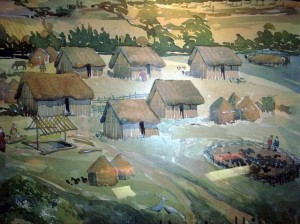Human Health c. 8000 BC January 30, 2011
Author: Beach Combing | in : Prehistoric , trackbackWe are told by catastrophists – many with years of state subsidised education behind them – that the present generation of children and teenagers will be the first in the west for two centuries to live shorter lives than their parents. The revolution in medical care that meant that the baby-boomers were able to eat worse diets than their parents and yet live longer has apparently come to an end: or rather it is too expensive to sustain. The young today – Beachcombing has only to dangle some chocolate over Little Miss B’s cradle… – are destined to gobble down even worse snacks than Beachcombing himself did in a larded northern childhood: Nik Naks, Marathon Bars and Lemon Sherbet anyone?
But this is not the first time in human experience that progress has led to health problems. Beachcombing is not referring here to the industrial revolution when a spike in carbs – don’t tell that nice Dr Atkins – did for three or four generations of Europe’s poor. But rather he has the Neolithic Revolution in mind when humanity’s long escape from the seasons began.
The Neolithic Revolution, the origins of village life and agriculture started c. 8000 BC in various parts of the world as hunter gatherers from Mexico to Thailand, turned to the easy life of putting up their feet and ordering drones and slaves to do their work for them.
The great mystery of the beginning of urbanisation – at least to Beachcombing who has wondered on and off about this for years – is how it had such disastrous effects on health. All archaeological evidence suggests that these new ‘urban’ communities (rural, of course, by modern standards), enjoyed shorter life-spans and shorter height – men were typically three or four inches shorter within the ‘garden cities’ than up in the hills where their cousins were still wrestling with grizzlies.
Explanations are various. Grumpy intellectuals are all for claiming that these ‘trapped’ urban humans reacted badly to the hierarchies that went with the thatching of the first cottages: this presupposes though that earlier hunter gatherers sat around the fire and talked out their problems.
Biologists are fascinated by the possibility that the domestication of animals meant that many illnesses – from measles to small pox – crossed into the human population and wreaked havoc: but can this explain height changes?
Modern hygienists believe that it was all to do with a lack of fresh air and excess raw sewage: yet the average resident of the first villages probably spent more time working outside (in the fields) than their hunter gatherer equivalents had in healthy food collection.
Dieticians worry that it was the sudden narrowing of the human diet around grains and rice – to the exclusion of the sixty or seventy gathered roots and berries of their earlier diet that did for the village dwellers: they may be right though that says something worrying about our present diets.
And Beachcombing? Beachcombing has a theory that it was the first beer and wine that was brewed in the village vats about this time. But this might just be because he was surrounded by Methodists in his youth and, in any case, he’s keeping quiet about it.
Beachcombing does want to go out by saying, that he is a Whig at heart and that he hopes for progress in human affairs. But he is always interested in historical examples of the Echternach Dance – two steps backwards, three steps forwards – as we race towards ‘the sunlit uplands’. Drbeachcombing AT yahoo DOT com ‘There must come a day, there will come a day…’



